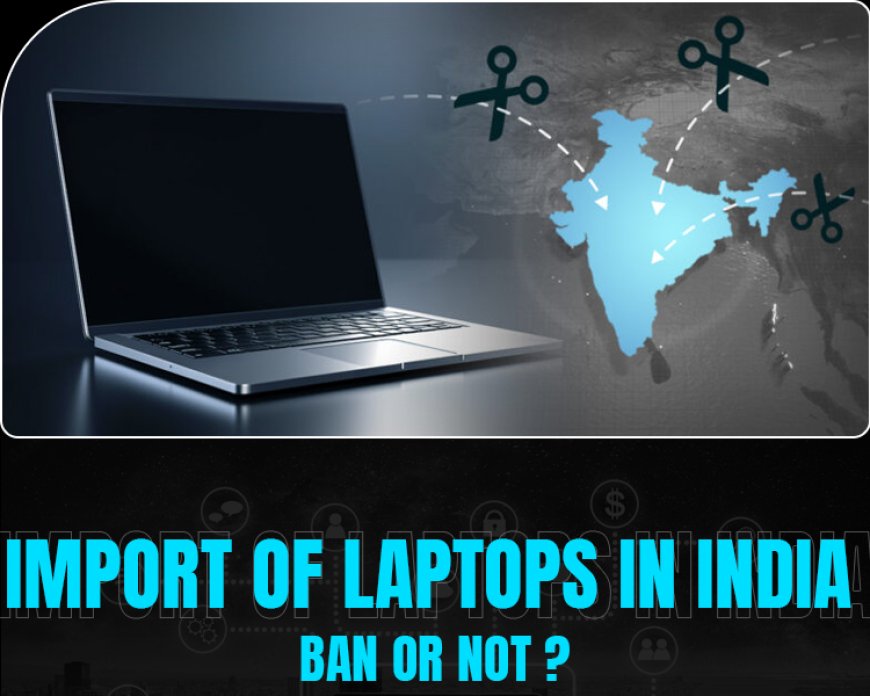Import of Laptops in India - Ban or Not ? Get all the details here
Want to know about India's current ban on laptop imports? Get all the details here - from the ban itself to the impact it could have on the laptop industry. Read now for the latest updates

The Indian government made a surprising decision to ban the import of laptops, which has led to intense debates and discussions throughout the country. The decision to do this has surprised many people in different industries because laptops are now essential tools for students, professionals, and businesses. In this blog, we will discuss why India has banned the import of laptops and what this could mean for the economy, education, and technology.
Reasons behind the Laptop Import Ban
Boosting Domestic Manufacturing:
The Indian government identifies one of the key reasons for the import ban as boosting the domestic industry and promoting the 'Make in India' initiative. The goal is to create an environment that allows local laptop makers to compete on a global basis and reduce their dependence on foreign imports. In this way, India hopes to become self-sufficient and establish itself as a major player in the global technological market.
Reducing Trade Imbalances:
Reducing Trade Imbalances: India has long struggled with trade imbalances, and the laptop import ban is considered an attempt to address this problem. The administration intends to decrease the trade deficit and boost the country's economic status by cutting imports and encouraging domestic production. This move is also consistent with the country's broader economic goals and trade policy.
Data Security Concerns:
In recent years, concerns over data security and privacy have become more prominent. The Indian government may have taken this step to address potential cybersecurity risks associated with imported laptops. By having more control over domestically manufactured devices, the government can impose stricter regulations on data handling and ensure better protection of sensitive information.
Implications of the Laptop Import Ban
Economic Impact:
The ban on laptop imports is likely to have mixed economic implications. While it may create opportunities for domestic manufacturers and lead to job creation in the technology sector, it could also result in an initial shortage of laptops and increased prices. The ban may also cause disruptions in the supply chain, affecting retailers and consumers in the short term. However, over time, it could lead to technological advancements and greater innovation within the country.
Education Sector:
The laptop import ban is likely to have a significant impact on the education sector. Laptops have become an integral part of modern education, facilitating online learning, research, and collaboration among students and educators. With limited access to imported laptops, there could be a temporary setback in the quality of education and research, particularly for those who rely on advanced computing capabilities. To address this, the government must invest in improving domestic laptop manufacturing to meet educational demands adequately.
Technological Advancements:
The ban could be a driving force in the growth of India's technology industry. With increased demand for domestically produced laptops, manufacturers will be encouraged to invest in research and development, leading to better products and innovations in the long run. This could bolster India's position as a technological hub and attract foreign investment in the sector.
Consumer Behavior and Preferences:
The ban may change consumer behavior, encouraging individuals to explore alternatives to laptops. This could lead to increased adoption of tablets, smartphones, or other portable computing devices. Additionally, it may also drive some consumers to seek ways to import laptops through unofficial channels, potentially leading to the growth of a black market.
Global Trade Relations:
The laptop import ban could strain trade relations between India and other countries, especially those with a significant stake in the technology market. Retaliatory measures from these nations could negatively impact India's exports of other goods and services. Therefore, diplomacy and open communication will be essential to prevent any further escalation of trade tensions.
Latest News on the Laptop Ban in India
As of the latest news, there is no ban on the import of laptops and computers in India, and the import remains unrestricted until at least October 31. Businesses and individuals can continue to import and purchase laptops and computers without any hindrance until further notice.
Conclusion
The Indian government's decision to ban laptop imports represents a bold step towards achieving economic self-reliance and boosting domestic manufacturing. While the move aims to address trade imbalances, address data security concerns, and promote indigenous technology, its implications are far-reaching. The ban will undoubtedly cause short-term disruptions and challenges across various sectors, particularly in education and the economy. However, it also presents an opportunity for the country to foster innovation, enhance technological capabilities, and strengthen its position in the global market. There are no bans on Laptop imports in India until October 31st. Anyone can import Laptops until further notice, without any restrictions.
What's Your Reaction?



















































